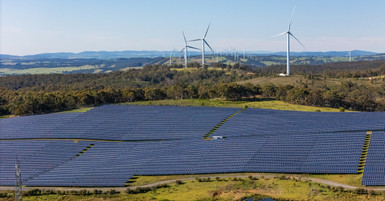Jan 3rd 2025
A Look at the Importance of Renewable Energy Projects
Many renewable energy projects have proven to be a benefit for commercial businesses across all industries. Many businesses make the switch to lower their energy costs, while others simply want to incorporate environmentally friendly practices in the workplace. Regardless of their reasoning, renewable energy projects, such as solar grids and systems, are a sustainable solution to a company’s energy needs. Learn more about the importance of renewable energy projects and how they shape commercial industries in various ways.
Different Types of Renewable Energy Projects for Commercial Businesses

Many choose solar as their primary renewable energy source for their business. However, your company could also benefit from many other important renewable energy projects. Here are some examples you can use for on-site energy generation or as a solution for energy efficiency.
On-Site Energy Generation
On-site energy generation offers businesses the opportunity to create renewable electricity directly on their property. Wind energy is an effective method, especially in areas with consistent wind patterns. Implement small-scale wind turbines to provide clean, renewable electricity.
Additionally, businesses located near water sources can explore small-scale hydroelectric systems. These systems utilize the natural flow of water to produce energy while minimizing environmental impact. Both energy systems can provide enough power for numerous industries.
Supporting Energy Systems
Supporting energy systems work together with renewable energy projects to optimize efficiency and reduce waste. Energy storage systems, such as batteries, store excess energy generated by renewable sources like solar and wind. Business operators can use this stored energy during peak demand times or when renewable sources are not actively generating power.
Green roofs and walls are another innovative solution that offers natural insulation for your business. These energy projects lower the need for heating and cooling. Including these upgrades as part of your business will grant you more savings on your energy costs.
Resource-Based Solutions
Resource-based solutions focus on harnessing natural and organic materials to meet energy needs. For example, geothermal energy uses the Earth’s natural heat for heating and cooling systems. This option works well for businesses with large facilities to provide a consistent and energy-efficient alternative to traditional methods.
Biomass energy offers resourceful solutions by converting organic materials, such as wood chips, agricultural by-products, or food scraps, into energy. Businesses that generate or have access to these materials can lower their waste while creating valuable renewable energy. Rather than disposing of those leftover materials, use them toward sustainable business practices.
How Solar Systems Are Transforming Renewable Energy
Solar energy, derived from the sun, is one of the most viable forms of renewable energy. Over the past decade, advancements in technology have made renewable energy more accessible and cost-effective for commercial use. Here are some ways solar energy leads the other renewable energy projects in performance.
Environmental Impact
Solar grid installations allow businesses to directly reduce their carbon footprint. Traditional energy sources, such as coal and gas, release greenhouse gases that have a negative impact on climate change. Solar power generates clean energy without harmful emissions.
Businesses actively contribute to preserving the planet for future generations by adopting solar systems. Lessen the reliance on fossil fuels and address pressing environmental needs by switching to solar.
Versatility Across Industries
Solar grids are incredibly versatile with their design and location. Install your solar grid on rooftops, open fields, parking lots, or even integrate them into building designs. Solar grids suit businesses of all sizes and sectors, from small startups to large-scale industrial plants.
For instance, retail companies can use rooftop solar arrays to power their operations, while agricultural businesses may benefit from solar-powered irrigation systems. No matter how you choose to position your solar panels, they can offer your business a consistent and reliable source of energy from anywhere.
Support from Policymakers
Local and federal governments are increasingly incentivizing solar energy adoption in commercial businesses. Subsidies, tax credits, and grants are available to offset installation costs, making solar an even more attractive option for businesses.
Operational Advantages for Businesses Adopting Solar

Solar systems grant financial gain and operational benefits for businesses. Learn more about the solutions these solar grids provide industries as they boost energy independence and minimize maintenance costs.
Energy Independence
Businesses gain control over their electricity supply by installing solar panels, reducing the odds of fluctuating energy prices and potential shortages. Gain a reliable energy output with a system that remains sustainable in the changing market.
Resilience Against Power Outages
Businesses that integrate solar panel systems with battery storage attain the added advantage of reliability during outages. Rather than waiting for a technician or the power company to resolve the issue, businesses can continue operation using their solar-generated energy, which is especially useful for industries reliant on uninterrupted power, such as health care or IT services.
Minimal Maintenance Costs
Manufacturers design modern solar energy systems for durability and low maintenance. Solar panels typically last 25–30 years with regular cleaning and annual inspections. Therefore, these installations are worth the investment in the long run.
Breaking Down the Process of Solar System Installation
Get started on your solar system installation by learning more about the setup. Assess your location for configuration and the maintenance and upkeep of solar grids.
Conduct a Feasibility Study
Conduct an energy audit to determine your business’s current energy usage and future needs before installing solar panels. Evaluate your building’s structure, available space, and local sunlight exposure. By doing so, you’ll have all the necessary information to give to your installer.
Choose the Right Solar Partner
Partnering with a reputable solar energy company ensures your business invests in a grid that fits your needs. The technician will guide you through the design, permitting, and installation process. Look for companies with strong industry experience and after-sales support.
Monitor and Maintain Your System
Once installed, use energy management tools to monitor performance and track savings. Consider implementing solar PV labels to indicate hazardous zones and your system’s expected energy output. Schedule periodic maintenance and check for damage to maintain stable energy performance.
Businesses that adopt renewable energy practices position themselves in a sustainable work environment that benefits all levels of the company. The economic incentives, reduced energy costs, and enhanced brand reputation make these energy producers a strategic investment. More specifically, solar grids are a great way to boost your company’s energy output without enlarging its carbon footprint.
By making the switch, you’ll be at an advantage against your competitors as your business continues to thrive. Start implementing renewable energy projects in your commercial business to gain these benefits and more today.

